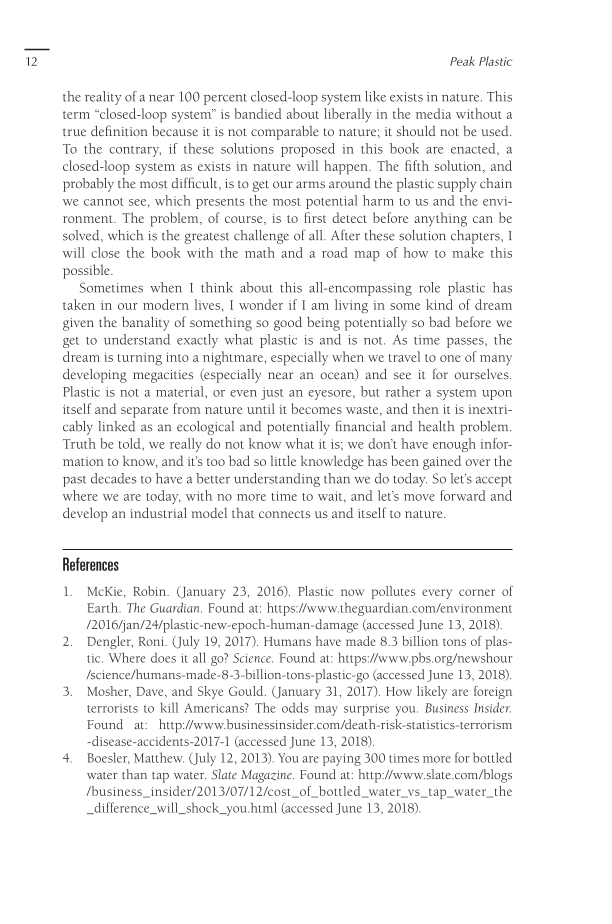12 Peak Plastic the reality of a near 100 percent closed-loop system like exists in nature. This term “closed-loop system” is bandied about liberally in the media without a true definition because it is not comparable to nature it should not be used. To the contrary, if these solutions proposed in this book are enacted, a closed-loop system as exists in nature will happen. The fifth solution, and probably the most difficult, is to get our arms around the plastic supply chain we cannot see, which presents the most potential harm to us and the envi- ronment. The problem, of course, is to first detect before anything can be solved, which is the greatest challenge of all. After these solution chapters, I will close the book with the math and a road map of how to make this possible. Sometimes when I think about this all-encompassing role plastic has taken in our modern lives, I wonder if I am living in some kind of dream given the banality of something so good being potentially so bad before we get to understand exactly what plastic is and is not. As time passes, the dream is turning into a nightmare, especially when we travel to one of many developing megacities (especially near an ocean) and see it for ourselves. Plastic is not a material, or even just an eyesore, but rather a system upon itself and separate from nature until it becomes waste, and then it is inextri- cably linked as an ecological and potentially financial and health problem. Truth be told, we really do not know what it is we don’t have enough infor- mation to know, and it’s too bad so little knowledge has been gained over the past decades to have a better understanding than we do today. So let’s accept where we are today, with no more time to wait, and let’s move forward and develop an industrial model that connects us and itself to nature. References 1. McKie, Robin. (January 23, 2016). Plastic now pollutes every corner of Earth. The Guardian. Found at: https://www.theguardian.com/environment /2016/jan/24/plastic-new-epoch-human-damage (accessed June 13, 2018). 2. Dengler, Roni. (July 19, 2017). Humans have made 8.3 billion tons of plas- tic. Where does it all go? Science. Found at: https://www.pbs.org/newshour /science/humans-made-8-3-billion-tons-plastic-go (accessed June 13, 2018). 3. Mosher, Dave, and Skye Gould. (January 31, 2017). How likely are foreign terrorists to kill Americans? The odds may surprise you. Business Insider. Found at: http://www.businessinsider.com/death-risk-statistics-terrorism -disease-accidents-2017-1 (accessed June 13, 2018). 4. Boesler, Matthew. (July 12, 2013). You are paying 300 times more for bottled water than tap water. Slate Magazine. Found at: http://www.slate.com/blogs /business_insider/2013/07/12/cost_of_bottled_water_vs_tap_water_the _difference_will_shock_you.html (accessed June 13, 2018).
Document Details My Account Print multiple pages
Print
You have printed 0 times in the last 24 hours.
Your print count will reset on at .
You may print 0 more time(s) before then.
You may print a maximum of 0 pages at a time.
































































































































































